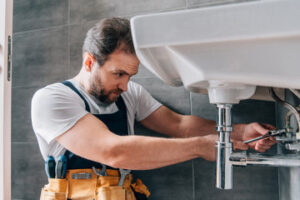Plumbers install and maintain the water systems that bring in water, sewage, and drainage. They also perform tasks related to water filtration and storage. Plumbing is a major part of many buildings around the world. It enables water to be supplied for drinking, cooking, sanitation, and cooling.
 Plumbers work with piping systems that carry water and gas in homes, schools, offices, factories, and other buildings. They are responsible for installing new pipes, repairing or replacing old ones, and connecting water-related appliances such as dishwashers. They may also install sewage systems and septic tanks to collect waste. These workers must know about local plumbing codes and regulations and accurately understand building plans and blueprints to lay pipes and ductwork during construction.
Plumbers work with piping systems that carry water and gas in homes, schools, offices, factories, and other buildings. They are responsible for installing new pipes, repairing or replacing old ones, and connecting water-related appliances such as dishwashers. They may also install sewage systems and septic tanks to collect waste. These workers must know about local plumbing codes and regulations and accurately understand building plans and blueprints to lay pipes and ductwork during construction.
The education required to become a plumber usually involves four to five years of training through an apprenticeship program sponsored by trade unions or employers. Apprentices receive a combination of classroom instruction and on-the-job training. During their training, they learn the basics of the plumbing trade and gain specific skills, such as choosing materials and fittings, identifying grades of pipes and working with the tools of their trade. They are also taught drafting and blueprint reading, consumer safety, and the laws and regulations that govern the plumbing industry.
Plumbers need a license from each state and community where they work. These licenses ensure that plumbers are trained to follow clear standards that protect the health and safety of the people they serve. A licensed plumber has the skills to repair and replace leaking pipes, install new plumbing systems, and fix sewers and septic tanks. They also have knowledge about building codes and local regulations. They use the right tools for each job to make the repairs easier and reduce the risk of injury. In addition, they know how to read blueprints and rough sketches.
Depending on the jurisdiction, plumbers may be required to complete formal apprenticeship programs or training courses to obtain their licenses. They can also earn additional certifications that improve their marketability and pay. These can be obtained through industry-related unions or vocational schools, and are largely achieved through classroom instruction and hands-on experience. Some plumbers choose to pursue certifications in areas such as gas line installation or water conservation.
A plumber is someone who repairs and installs pipes that carry liquids such as water or gases. They also repair fixtures such as toilets and sinks.
Many plumbers work as independent contractors or for a plumbing company. They often earn a high income and have good benefits such as health insurance and retirement plans.
Experience is an essential aspect of becoming a plumber. It can be acquired through life experiences and work-related training or through vocational school.
People who have experience tend to be more knowledgeable than those who have not. They know more about the subject matter, and are better able to solve problems quickly and efficiently.
Problem-solving skills are important for plumbers because they often have to solve complex issues, and it is important to have an understanding of how the various parts of a pipe system work together. They are also required to understand how to calculate water pressure and capacity.
Plumbing is a complex job that requires both technical and personal skills. It is important to have strong problem-solving and customer service skills, as well as physical fitness to work in cramped spaces.
Depending on the location and type of plumbing job, plumbers are often required to climb and lift heavy equipment and pipe fixtures. Their manual dexterity is also necessary to use specialized tools and gauges correctly.
They need good vision to spot problems and line up fittings properly. They must also have physical strength to carry large pipes, keep their tools and equipment steady for long periods of time and tighten clasps and fittings. They must also have fine motor skills to place, fasten and operate small tools and parts.
Expert plumbers are able to diagnose and troubleshoot complex plumbing problems, and they have the tools and experience to perform repairs and installations quickly and efficiently. They also have a deep understanding of local plumbing codes and regulations, and they ensure that all work is completed to the highest standards of safety and quality.